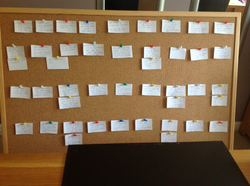
However, I had a realisation this week. I might be inexperienced at writing but I am very experienced at planning. And it just so happens that planning is actually a very useful tool to a writer, but it may not work for everyone.
In terms of credentials I have been a project management professional since 1996 and have successfully managed a variety of different types of multi million pound projects. My friends also frequently call me Little Miss Organised so it must be true!
Planning is not about stubbing out creative flare and spontaneity, it's simply about putting a structure around it and making it easier for you.
So here's my ten point planning guide for writers:
1. Find time to plan. Put aside some time to plan. It will save you time in the long run, honestly it will.
2. Visualise your end goal. Choose which of your writing projects you want to focus on and picture the goal you are aiming for. In the case of a novel, what is the conclusion or final scene you are building up to?
3. Establish the key events. What are the key events in the story that will lead your characters to the conclusion? What are the key decision points for them? What conflict or disasters will befall them?
4. Next level of detail. Now break down the key events. What are the scenes before and after these events? How has the key event changed the characters? What will be the purpose of these scenes? Who is in them? What do they reveal about each character?
5. Make it visual. Annotate your plan in some way. I have a large cork board where I pin key plot points in order. I use coloured pins to denote which story thread it is so I can quickly see if they are well spaced out. Coloured sticky notes work well too. It's a great excuse to buy stationery!
6. Characters and setting. If you haven't done so already sketch out your characters. What do they look like? Any distinguishing features? What habits or rituals do they have? Who are their key relationships with? What are they like when they are at their best and worst? You need to know their backstory even if it never actually appears in the novel. I have a scrapbook where I dedicate a two page spread to each main character. I cut pictures out of magazines and print things off the internet to help the detail in my descriptions and to ensure consistency. Think about where each scene will be. Can you describe it sufficiently to evoke emotion and connection in your reader. I find property sites useful for finding the homes of my characters. I stick floor-plans in my scrapbook! Take care when writing about a geographical area you are unfamiliar with, someone else will always know it well and may be put off by inaccuracies. Do your research!
7. Draw up a timetable. It doesn't have to be elaborate but you sometimes need to prove to yourself that you do have time to write. Commit to a regular writing schedule and then stick to it. See it as an important meeting or appointment you must attend. Don't cancel on yourself you wouldn't do it to a friend!
8. Set yourself some targets. Firstly, when will you finish your plan? How many words are you going to write each week? What do you want to have achieved by Christmas? What do you want to have achieved by this time next year? OK that last one might be a bit ambitious but you get the idea!
9. Take action. This is the most important one on the list. You need to do what you said you would do otherwise it's all been pointless! So take action!
10. Congratulate yourself when you meet your targets. When you have a million other demands on your time it's hard to stick to the plan, so when you do take action make sure you give yourself recognition, be it a glass of wine or a figurative pat on the back. You will feel a great sense of accomplishment when you start ticking off the things you said you'd do. I have a spread sheet with target word count for writing days that I fill in. It has a formula so that when I fall short on my target word count it pops up with Boo! But when I meet or exceed the word count it pops up with Hurray! It's a bit panto but it works for me!
Lastly, something that I really believe is that if you fail to plan, then you plan to fail - so get planning!
 RSS Feed
RSS Feed